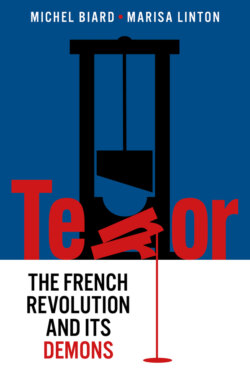Читать книгу Terror - Michel Biard - Страница 11
Chapter 1 The Terror – a Concept Imposed by the Thermidorians
ОглавлениеOne of the first texts openly attacking the French Revolution, Edmund Burke’s Reflections on the Revolution in France, was published in 1790. This work by the Anglo-Irish author and Member of Parliament was quickly translated into French and other languages.1 For some it was seen as a prophetic vision announcing the Terror, as it denounced the violence of 1789, especially the killing of two royal guards during the revolutionary days of 5 and 6 October, when a crowd broke into the palace of Versailles, and under the threat of popular violence, the king agreed to move to Paris, to be under the watchful eyes of the populace. Burke not only uses the word ‘terror’ but also describes the Constituent Assembly as a meeting of deputies trembling before popular violence: ‘It is beyond doubt, that, under the terror of the bayonet, and the lamp-post, and the torch to their houses, they are obliged to adopt all the crude and desperate measures suggested by clubs composed of a monstrous medley of all conditions, tongues, and nations.’2
A very different view was taken by another British author, Thomas Paine, already known for having politically engaged several years earlier with the independence movement in the American colonies with his seminal pro-revolutionary pamphlet, Common Sense. Paine strongly objected to Burke’s exaggeration of the extent of the violence of 1789, as well as his comparisons with the so-called ‘Glorious Revolution’ of the late seventeenth century, which Burke depicted in glowing, Manichean terms. Paine sharply responded to Burke in Rights of Man, a work published in early 1791 and translated into French that May. Whilst Paine also used the word ‘terror’, he saw its purpose and the reasons behind it very differently. For Paine, if the ignorant populace resorted to inflicting ‘terror’, this was the consequence of them having learned such tactics from the autocratic government under which they had lived. Paine stressed that the violence of 1789 could only be understood if viewed in relation to the cruelty of the Ancien Régime, with the ‘terror’ that the people suffered provoking the appearance of another ‘terror’:
It is over the lowest class of mankind that government by terror is intended to operate, and it is on them that it operates to the worst effect. They have sense enough to feel they are the objects aimed at; and they inflict in their turn the examples of terror they have been instructed to practise.3
To this idea of a passive ‘terror’ (which one suffers under) ripening into an active, vengeful ‘terror’ (which is directed at one’s enemies), Paine added that governments need to be taught about the notion of humanity before asking it of ‘the people’. To prove his point, Paine recalled the punishment of Damiens, who had been convicted in 1757 of having attempted regicide against Louis XV. Damiens was subjected to extensive ritualized torture, climaxing in his being ‘drawn and quartered’; the sentence carried out as a public spectacle to terrify the populace. Paine concluded that governments make a mistake in ‘governing men by terror, instead of reason’.4 One year later, in late July 1792, just before the fall of the constitutional monarchy, Robespierre took up the link between ‘terror’ and bad government, assimilating ‘terror’ with despotism: ‘Montesquieu said that virtue was the principle of republican government, honour that of a monarchy, and terror that of despotism. We need to imagine a new principle for the new framework of things that we are in.’5 Montesquieu was again a source for Robespierre in early 1794 when he attempted to bring together ‘terror’ and ‘virtue’ in his speech on 5 February 1794 (17 Pluviôse Year II). Without virtue, terror was disastrous, but virtue was powerless without ‘terror’.6 The despotism of liberty, to take up the bold oxymoron coined by Robespierre, the union between ‘terror’ and ‘virtue’, between ‘terror’ and justice, would be linked to a state of exceptional or crisis government that was by essence transitional – the condition of France in 1793 and in the Year II – and not to a preconceived political project as the ultimate goal in itself. For Robespierre, ‘terror’ was closely linked to justice – a harsh and improvised justice for a time of crisis, but still justice. After the fall of Robespierre, the meaning of ‘terror’ would quickly evolve into something rather different, when the victorious Thermidorians started to retrospectively invent the idea of a unified ‘system’ of terror.
